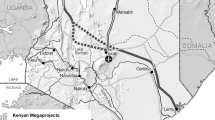Abstract
Post-development theory usually engages with examples from Latin America and India and investigates alternative concepts and practices by progressive social movements. This article addresses a post-development concept which originates in Iran, Gharbzadegi or occidentosis, which after the Islamic revolution in 1979 was promoted by the anti-Western Iranian government. It argues that the instrumentalization by right-wing governments should not distract from the emancipatory potential of post-development concepts.
Similar content being viewed by others
References
Acosta, Alberto. 2009. Das ‘Buen Vivir’. Die Schaffung einer Utopie. Juridikum 4: 219–223.
Afshar, Haleh. 1987. Women, marriage and the state in Iran. In The Women, Gender & Development Reader, ed. Nalini Visvanathan, Lynn Duggan, and Laurie Nisonogg, 317–320. London: Zed Books.
Afshari, Reza. 1994. A critique of Dabashi’s reconstruction of Islamic ideology as a prerequisite for the Iranian Revolution. Critique: Critical Middle Eastern Studies 3 (5): 67–83.
Al-i Ahmad, Jalal. 1984. (1962). Occidentosis: A Plague from the West. Berkeley: Mizan Press.
Alvares, Claude. 1992. Science, Development and Violence. The Revolt against Modernity. Delhi: Oxford University Press.
Blaikie, Piers. 2000. Development: post-, anti-, and populist. A critical review. Environment and Planning 32 (6): 1023–1050.
Brass, Tom. 2000. Peasants, Populism and Postmodernism. The Return of the Agrarian Myth. London: Frank Cass.
Corbridge, Stuart. 1998. Beneath the Pavement only Soil’: The Poverty of Post-Development. Journal of Development Studies 34 (6): 138–148.
Dabashi, Hamid. 2006. Theology of Discontent. The Ideological foundation of the Islamic Revolution in Iran. 2. A. Brunswick: Transaction Publishers.
Escobar, Arturo. 1995. Encountering Development. The Making and Unmaking of the Third World. Princeton: Princeton University Press.
Escobar, Arturo. 2012. Encountering Development. The Making and Unmaking of the Third World, Second expanded ed. Princeton: Princeton University Press.
Esteva, Gustavo. 1995. FIESTA – jenseits von Entwicklung, Hilfe und Politik. Frankfurt a.M.: Brandes & Apsel.
Esteva, Gustavo, and Madhu Suri Prakash. 1998. GRASSROOTS post-Modernism. Remaking the Soil of Cultures. London: Zed Books.
Fatheuer, Thomas. 2011. Buen Vivir. Eine kurze Einführung in Lateinamerikas neue Konzepte zum guten Leben und zu den Rechten der Natur. Berlin: Heinrich-Böll-Stiftung.
Gudynas, Eduardo. 2012. Buen Vivir. Das gute Leben jenseits von Entwicklung und Wachstum. Berlin: Rosa-Luxemburg-Stiftung.
Hanson, Brad. 1983. The ‘Westoxication’ of Iran: Depictions and reactions of Behrangi, Al-e Ahmad, and Shari’ati. International Journal of Middle East Studies 15: 1–23.
Hasib, S.Waqar. 2004. The Iranian Constitution: An Exercise in Contradictions. Al Nakhlah. The Fletcher School Online Journal for issues related to Southwest Asia and Islamic Civilization 1: 1–10.
Hauck, Gerhard. 2012. Globale Vergesellschaftung und koloniale Differenz. Münster: Westfälisches Dampfboot.
Hettne, Björn, and Shariati Ali (eds.). 1995. Development Theory and the Three Worlds: Towards an international political economy of development, 2.A. Harlow: Longman.
Iran (Islamic Republic of) 1989: Constitution of 1979 with Amendments through 1989. Online: https://www.constituteproject.org/constitution/Iran_1989.pdf?lang=en. Accessed 17 Sept 2019.
Khamene’i, Ayatullah Sayyid Ali, and Shariati Ali (eds.). 1997. Iqbal – Manifestation of the Islamic Spirit. Two Contemporary Muslim Views. Chicago: Kazi Publications.
Kiely, Ray. 1999. The Last Refuge of the Noble Savage? A critical assessment of Post-Development Theory’. The European Journal of Development Research 11 (1): 30–55.
Najmabadi, Afseneh. 1991. Hazards of Modernity and Morality: Women, the State and Ideology in Contemporary Iran. In Women, Islam and the State, ed. Deniz Kandiyoti, 48–76. London: Palgrave Macmillan.
Nanda, Meera. 1999. Who needs Post-Development? Discourses of Difference, Green Revolution and Agrarian Populism in India. Journal of Developing Societies 15 (1): 5–31.
Nandy, Ashis (ed.). 1988. Science, Hegemony and Violence. A Requiem for Modernity. UNU. Tokyo: Oxford University Press.
Pieterse, Nederveen. 1998. My Paradigm or Yours? Alternative Development, Post-Development, Reflexive Development. Development and Change 29: 343–373.
Pesaran, M.H. 1982. The System of Dependent Capitalism in Pre- and Post-Revolutionary Iran. International Journal of Middle East Studies 14 (4): 501–522.
Pesaran, Evaleila. 2008. Towards and Anti-Western Stance: The Economic Discourse of Iran’s 1979 Revolution. Iranian Studies 41 (5): 693–718.
Rahnema, Majid. 1997. Development and the People’s Immune System: The Story of another Variety of AIDS. Rahnema & Bawtree 1997: 111–129.
Rahnema, Majid, and Victoria Bawtree (eds.). 1997. The Post-Development Reader. London: Zed Books.
Revenue Watch Institute. 2012. Iran’s Oil and Gas Management. A Ticking Bomb? Briefing February. https://resourcegovernance.org/sites/default/files/rwi_bp_iran2.pdf. 30 June 2018.
Rist, Gilbert. 1997. The History of Development. From Western Origins to Global Faith. London: Zed Books.
Saghafi, Morad. 2001. Crossing the desert: Iranian intellectuals after the Islamic revolution. Critique: Critical Middle Eastern Studies 10 (18): 15–45.
Said, Edward. 1978. Orientalism. New York: Vintage Books.
Sarkhosh, Soussan. 2000. Verwestlichung versus Modernsierung: Gegenwärtige Diskurs im Iran. In Subjekte und Systeme. Soziologische und Anthropologische Annäherungen. Festschrift für Christian Sigrist zum 65. Geburtstag, ed. Günter Best and Reinhart Kößler, 249–257. Frankfurt a.M.: IKO-Verlag für Interkulturelle Kommunikation.
Shiva, Vandana. 1989. Staying Alive: Women, Ecology and Survival in India. London: Zed Books.
Zamirirad, Azadeh, and Arash Sarkohi. 2011. Herrschaft und Moderne im politischen Diskurs Irans. WeltTrends Papiere 17. Potsdam: Universitätsverlag Potsdam.
Ziai, Aram. 2004. The ambivalence of post-development: between reactionary populism and radical democracy. Third World Quarterly 25 (6): 1045–1061.
Ziai, Aram. 2015. Post-Development: Premature Burials and Haunting Ghosts’. Development and Change 46 (4): 833–854.
Ziai, Aram. 2017. “I am not a Postdevelopmentalist, but…” – The influence of Post-Development on development studies. Third World Quarterly 38 (12): 2719–2734.
Author information
Authors and Affiliations
Corresponding author
Additional information
Publisher's Note
Springer Nature remains neutral with regard to jurisdictional claims in published maps and institutional affiliations.
Rights and permissions
About this article
Cite this article
Ziai, A. Gharbzadegi in Iran: A Reactionary Alternative to ‘Development’?. Development 62, 160–166 (2019). https://doi.org/10.1057/s41301-019-00221-4
Published:
Issue Date:
DOI: https://doi.org/10.1057/s41301-019-00221-4




